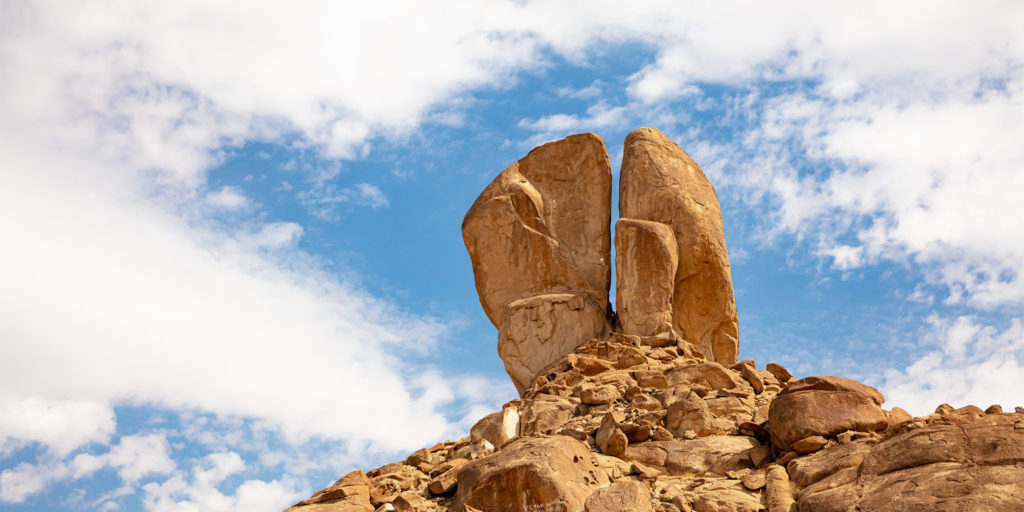
|
|
 Believers in the personal pre-existence of the Lord Yahushua Christ often appeal to the words of the Apostle Paul in 1 Corinthians 10:4, where he says of the Israelites in the wilderness that they ‘all drank the same spiritual drink; for they drank of that spiritual rock that followed them; and that rock was Christ.’
Believers in the personal pre-existence of the Lord Yahushua Christ often appeal to the words of the Apostle Paul in 1 Corinthians 10:4, where he says of the Israelites in the wilderness that they ‘all drank the same spiritual drink; for they drank of that spiritual rock that followed them; and that rock was Christ.’
It is argued from this that Christ himself personally accompanied the people of Israel as they journeyed through the wilderness to the Promised Land. The verse is often tied in with several Old Testament texts, which describe Yahuwah as a Rock (Deut. 32:4; Ps. 18:2, 31). Since Yahuwah is the rock, and Christ is also the rock who accompanied Israel, Christ must therefore be Yahuwah, it is believed.
This interpretation, common though it is, suffers from a number of serious defects. The first of these concerns the meaning of the term “Christ.” Too often we use it simply as a proper name for Yahushua as if it were his surname (last name). “Christos” is the Greek form of the Hebrew word “Messiah,” meaning “the anointed one.” It was a title given to the kings of Israel. David was a “messiah” and was a type and forerunner of the one who would deliver the people of Israel and establish the Kingdom of Yahuwah.
The coming of the Messiah is a common theme of Old Testament prophecy. He was to be the seed of the woman (Gen. 3:15), the seed of Abraham (Gen. 22:18; Gal. 3:16, 19), the seed of Judah (Gen. 49:10; 1 Chron. 5:2), and the seed of David (2 Sam. 7:12-14; Isa. 11:1, 10; Rom. 1:3; 2 Tim. 2:8).
“Seed” in all these scriptures means “descendant.” This points to the fact that the Messiah was prophesied to arise from the human race. Nothing in the Old Testament suggests that the promised seed was already in existence in another form. For Paul to have taught that the Messiah was actually and personally present in the wilderness would have been a staggering contradiction of the words of the prophets.
The second major objection to this theory is the fact that Yahuwah used angels to minister to Israel. The New Testament declares in three places that the Law was given by angels (Acts 7:38, 53; Gal. 3:19; Heb. 2:2). In each of these passages an angelic giving of the Law forms an important part of the argument. Study each in its context with care and you will see that the common theme is the superiority of the Gospel to the Law. The Law was given only by angels, but the Gospel was brought by the Son of Yahuwah and is therefore vastly superior to it. Christ could not have had any part, therefore, either in giving the Law to Israel, or in ministering to the Israelites in the wilderness.
Since the Messiah could not have been present personally in the wilderness, Paul’s statement must mean that the rock represented or typified Christ in some way. It is not uncommon for Scripture to use the verb “to be” in a representational sense. Yahushua said, “I am the door” (John 10:7); “I am the true vine” (John 15:1). In the institution of the Lord’s Supper he said that the bread “is my body” and that the cup “is my blood” (1 Cor. 11:24- 25), clearly meaning that they symbolized his broken body and shed blood.
This interpretation is strengthened by a close study of the whole passage from verse 1 to verse 11 of 1 Corinthians 10. Twice Paul states that the experiences of Israel were examples for us (v. 6, 11). The Greek word used here actually means “types.”
The passing of the Israelites through the cloud and through the Red Sea was a “type” of Christian baptism. They were baptized “into Moses” (v. 2, NASB) as we are baptized “into Christ” (Rom. 6:3; 1 Cor. 12:13; Gal. 3:27). Verses 3 and 4 continue the typological parallel by referring to the incidents of the giving of the manna in Exodus 16, and the incidents at Rephidim and Kadesh when Yahuwah miraculously supplied water out of a rock (Ex. 17:1-7; Num. 20:1-13).
The “spiritual food” mentioned in verse 3 is clearly the manna miraculously given daily to Israel over a period of 40 years. The giving of the manna is recorded in Exodus 16 and forms the background to John 6.
There are two incidents involving a rock recorded during the wilderness wanderings of the Israelites, and it is important to notice the difference between them.
The first incident occurred just after the miraculous giving of the manna. Israel arrived at Rephidim (Ex. 17:1) and immediately began to complain about lack of water, whereupon Yahuwah commanded Moses to strike the rock. Water gushed out and the people’s thirst was satisfied. The striking of the rock typifies the fact that Christ our Rock was smitten for us. The miraculous giving of the water typifies the giving of the Holy Spirit, the water of life (John 7:37-39).

The second incident occurred toward the end of the wandering in the wilderness. Again, Israel complained for lack of water and again Yahuwah provided for their needs. This time, however, He clearly instructed Moses to speak to the rock, but in his anger Moses disobeyed and struck the rock twice (Num. 20:1-12).
In smiting the rock instead of speaking to it, Moses was guilty of destroying the type. The rock in Exodus 17 typified Christ in the flesh, smitten to give to us the water of life, while the rock in Numbers 20 typified Christ our High Priest, not to be smitten twice (cp. Heb. 6:6), but only to be spoken to in order to supply the water of life.
The first incident occurred at the beginning of the wanderings, the second at the end; both incidents thus form a parable of Christ’s continuous presence with his people during our “wilderness wanderings.”
The two incidents we have looked at took place in entirely different locations, and there is a different Hebrew word for “rock” used in each place. In Exodus 17 the word is tsur and in Numbers 20 it is sela. So what does Paul mean when he states that “they drank of that spiritual rock which followed them”? Obviously a literal rock did not accompany Israel through the wilderness, and many feel that this is proof that Christ himself went with them. The answer is that Paul is using the language of Christian experience and reading it back into the Old Testament type. This is shown clearly by his reference to baptism in verses 1 and 2. The Israelites were not literally “baptized.” In fact, we are told that the water did not come near them; they walked dry shod through the Red Sea. But their experience is a close enough parallel for Paul to say they were “baptized into Moses.” Likewise the rock did not literally follow them. It was simply a type of Christ accompanying us through life.
This is a non-WLC article written by John Cunningham.
We have taken out from the original article all pagan names and titles of the Father and Son, and have replaced them with the original given names. Furthermore, we have restored in the Scriptures quoted the names of the Father and Son, as they were originally written by the inspired authors of the Bible. -WLC Team